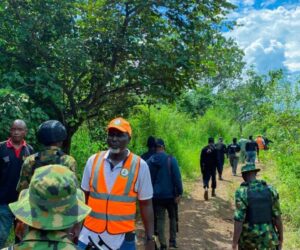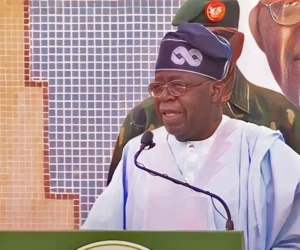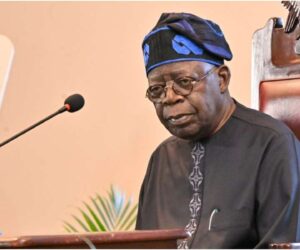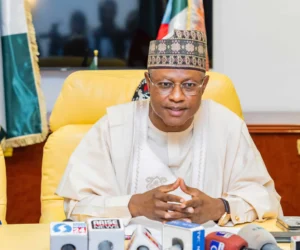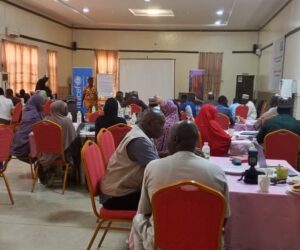That Nigeria is battling profound insecurity is not in doubt. It couldn’t have been, given the wanton killings, kidnapping for ransom, and displacement of entire communities, particularly in the worst-hit states of the South-East, North-Central, and North-West regions.
Over the years, multiple factors have contributed to insecurity even before the administration of President Bola Tinubu came on board. These factors include economic, social, and cultural issues, and they are being exploited by terrorists and other armed criminal groups. The terror groups have all been capitalizing on them to wage war across the country, targeting both Christians and Muslims.
States like Plateau, Benue, Borno, Yobe, Niger, Katsina, Kebbi, Kwara, Sokoto, and Zamfara have continued to experience sustained attacks by terrorists, bandits, and other criminal groups that have made life brutish for residents, especially those in rural areas with little or no security presence.
Although these killings preceded the current administration, in the two years since President Tinubu assumed office, new armed groups have emerged, including Lakurawa in Sokoto and Kebbi states, as well as Mamuda in Kwara State.
In Katsina, a predominantly Muslim state, residents of several communities in the worst-hit local government areas have abandoned their homes, seeking refuge in relatively peaceful towns, including the state capital. In local government areas such as Danmusa, Faskari, Safana, Kankara, Jibiya, Batsari, and Dandume, almost all of whose residents are Muslims, the stories are tragic and unending. The latest efforts to negotiate with the killers have not led to an improved security situation.
In Benue State, whose population is largely Christian, there are scores of internally displaced persons’ camps populated by families whose communities have come under relentless attacks. Benue is particularly significant because residents of some localities, especially in the Guma and Logo local government areas, have continued to suffer sustained attacks.
According to Amnesty International, about 2,600 persons, mainly women and children, were killed in attacks on 50 communities in the state between January 2023 and February 2024. From January 2025 to date, no fewer than 500 persons have reportedly been killed in large-scale attacks in the state, excluding those killed in more minor raids that rarely get reported.
The security situation in Benue is so precarious that at least 13 of its 23 local government areas host IDP camps. Indeed, the presence of such camps across several states is sufficient proof that Nigeria is facing serious security challenges perpetrated by persons who kill for the fun of it.
These killers, whose actions threaten Nigeria’s continued existence, have also murdered hundreds and abducted scores in communities across Enugu, Anambra, Imo, among others. While some of these killings targeted Christians and occurred in churches, others took place in mosques. Only recently, scores were massacred in a mosque at Gidan Mantau community at Malumfashi local government area of Katsina State.
The pattern of these killings, spanning both Muslim and Christian-dominated communities, renders absurd any attempt to brand the violence as a genocide against one religion. In the Christian-dominated South-East, for instance, “unknown gunmen” have repeatedly attacked and killed both Christians and Muslims alike.
Cruz’s Claim
Curiously, Senator Ted Cruz sponsored a bill titled the “Nigeria Religious Freedom Accountability Act of 2025,” seeking the United States of America to impose sanctions against Nigeria. He claimed that armed groups had, for decades, gone from house to house hunting down Christians, killing wives, children, and Catholic priests in a supposed attempt to wipe out Christians.
Cruz accused the Nigerian government of enabling what he called a “massacre against Christians,” alleging a surge in attacks across the Middle Belt, also known as the North-Central region. Working with questionable figures possibly supplied by disinformation peddlers, he asserted that 50,000 Christians had been killed since 2009, with 2,000 schools and 18,000 churches destroyed by Islamist armed groups.
That he failed to cite any credible sources exposes either a mischievous intent or a deliberate attempt to spread falsehood. Either way, his argument collapses under its own illogic and pedantry. Yet, Cruz has introduced a bill to sanction Nigerian officials whom he accused of “ignoring and even facilitating the mass murder of Christians.”
But individuals like Cruz, who continually promote the narrative of a Christian genocide, expose nothing but their ignorance of Nigeria’s complex reality. The victims of these killings cut across both religions, just as the perpetrators do. It is a war between the Nigerian State and non-state actors challenging the nation’s sovereignty.
That is why Cruz’s classification and his calls for the U.S. President to designate Nigeria as a “Country of Concern” over a supposed genocide against Christians sound vexatious, baseless, and suspicious. The logical deduction is that those who advance such claims derive satisfaction from distorting facts and seem determined to exploit Nigeria’s fault lines.
If the killings in Christian-dominated areas, as Cruz claims, are part of a grand scheme to eliminate Christians, what then explains the equally relentless attacks in Muslim-dominated communities? Even Boko Haram’s atrocities, often wrongly associated with Islam, cannot be interpreted as genocide against Christians, because their victims have included both Muslims and Christians.
Borno, Yobe, and Adamawa, Muslim-dominated states, have borne the brunt of Boko Haram’s terror. Scores of the residents have been killed, houses burnt, and many communities displaced. Kano, the country’s most populous and predominantly Muslim state, also suffered deadly attacks by Boko Haram terrorists. Yet Cruz and his fellow travellers in falsehood would have us believe in a Christian genocide? That narrative is self-serving and undermines efforts to foster dialogue, national healing, and religious harmony.
It is clear that Nigeria is facing external influences determined to widen our divisions using the false claim of a Christian genocide.
The Real Task
Rather than spend time and energy debunking such deceptive narratives, the Nigerian government must focus on strengthening its counter-insurgency efforts. Regardless of official rhetoric, the truth remains that the government has failed to protect lives and property.
Amnesty International reports that at least 10,217 people have been killed since the inception of the Tinubu administration. These deaths occurred in attacks across Benue, Edo, Katsina, Kebbi, Plateau, Sokoto, and Zamfara states. To describe this record as disappointing, especially for a president who pledged to improve security, is an understatement. The government should be concerned that it has failed the basic test of governance: protecting lives and property.
The Tinubu administration has not done enough. Its failure to decisively confront this menace has created room for jingoists like Cruz to peddle falsehoods that tend to damage Nigeria’s image. Nigerians of good conscience must therefore ask: What does Ted Cruz really want by spreading this dangerous and false narrative?




